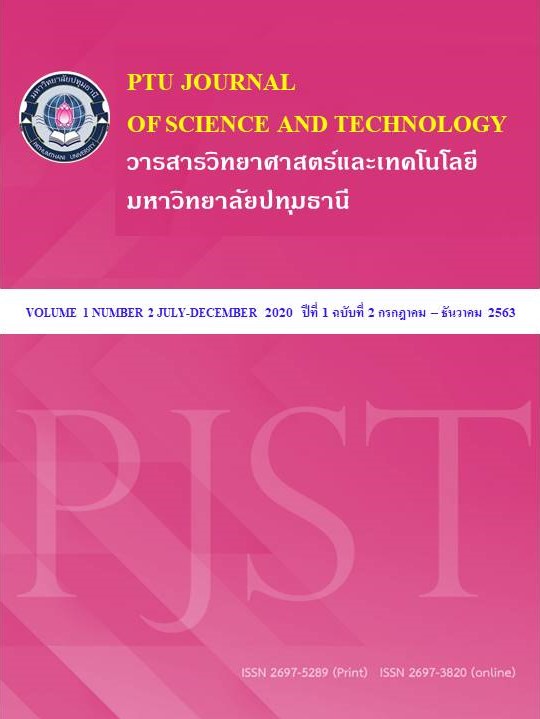การวิเคราะห์องค์ประกอบเชิงสำรวจของแบบประเมินจิตตปัญญาทางการพยาบาล
Main Article Content
บทคัดย่อ
การวิจัยนี้ มีวัตถุประสงค์เพื่อวิเคราะห์องค์ประกอบจิตตปัญญาของพยาบาล กลุ่มตัวอย่างที่ใช้ คือ พยาบาลวิชาชีพที่ปฏิบัติงานในโรงพยาบาลของรัฐ จำนวน 350 คน เครื่องมือวิจัยได้แก่ แบบประเมินจิตปัญญาทางการพยาบาล ผ่านการตรวจสอบความตรงตามเนื้อหาได้ค่า IOC อยู่ระหว่าง 0.60-1.00 ค่าความเชื่อมั่น เท่ากับ 0.94 หลังจากเก็บรวบรวมข้อมูลแล้วนำข้อมูลที่ได้มาวิเคราะห์องค์ประกอบด้วยวิธีการสกัดองค์ประกอบหลักหมุนแกนด้วยวิธีไดเร็คอ็อบลิมิน
ผลการวิจัยสรุปได้ว่า แบบประเมินจิตปัญญาทางการพยาบาล ประกอบด้วย 23 ข้อคำถาม มีค่าน้ำหนักปัจจัย ระหว่าง .517-.807 และสามารถอธิบายความแปรปรวนได้ร้อยละ 52.776 แบ่งเป็น 4 องค์ประกอบ คือ 1) ด้านใจตื่นรู้ เป็นองค์ประกอบที่สามารถอธิบายความแปรปรวนได้มากที่สุด คือร้อยละ 25.306 ประกอบด้วย 6 ข้อคำถาม 2) ด้านความเข้าใจความจริงของชีวิต สามารถอธิบายความแปรปรวนได้ ร้อยละ 11.763 ประกอบด้วย 3 ข้อคำถาม 3) ด้านพลังแห่งความเมตตา สามารถอธิบายความแปรปรวนได้ ร้อยละ 10.361 ประกอบด้วย 10 ข้อคำถาม 4) ด้านความมีใจกรุณา สามารถอธิบายความแปรปรวนได้ ร้อยละ 5.377 ประกอบด้วย 4 ข้อคำถาม ผลการวิจัยครั้งนี้ สามารถนำข้อมูลไปใช้ในการช่วยพัฒนาความสามารถในการปฏิบัติการพยาบาลด้านจิตปัญญาต่อไป
Article Details
ความคิดเห็นและข้อเสนอแนะใดๆ ที่นำเสนอในบทความเป็นของผู้เขียนแต่เพียงผู้เดียว โดยบรรณาธิการ กองบรรณาธิการ และคณะกรรมการวารสารวิทยาศาสตร์และเทคโนโลยี มหาวิทยาลัยปทุมธานี ไม่ได้มีส่วนเกี่ยวข้องแต่อย่างใด มหาวิทยาลัย บรรณาธิการ และกองบรรณาธิการจะไม่รับผิดชอบต่อข้อผิดพลาดหรือผลที่เกิดจากการใช้ข้อมูลที่ปรากฏในวารสารฉบับนี้
เอกสารอ้างอิง
แห่งจุฬาลงกรณ์มหาวิทยาลัย.
พรทิพา กุฎุมพินานนท์. (2551). การศึกษาวิเคราะห์กระบวนการเรียนรู้ในพระพุทธศาสนาและการ
พัฒนาคน. (ปริญญานิพนธ์พุทธศาสตรมหาบัณฑิต). มหาวิทยาลัยมหาจุฬาลงกรณราชวิทยาลัย.กรุงเทพฯ.
พระพุทธโฆสเถระ. (2557). คัมภีร์วิสุทธิมรรค. พิมพ์ครั้งที่ 5. กรุงเทพฯ: ประยูรวงศ์พริ้นติ้ง.
พิณนภา หมวกยอด.(2554). การสังเคราะห์องค์ความรู้เกี่ยวกับสุขภาวะทางจิตวิญญาณในบริบทของ
สังคมไทย. (ปริญญานิพนธ์วิทยาศาสตร์ดุษฎีบัณฑิต). มหาวิทยาลัยศรีนครินทรวิโรฒ.กรุงเทพฯ.
พิชญรัชต์ บุญช่วย. (2549). การศึกษากระบวนการสร้างภาวนา 4 โดยใช้หลักไตรสิกขา.
(ปริญญานิพนธ์พุทธศาสตรมหาบัณฑิต). มหาวิทยาลัยมหาจุฬาลงกรณราชวิทยาลัย..กรุงเทพฯ.
พุทธทาสภิกขุ. (2525). บรมธรรม. (พิมพ์ครั้งที่ 4.) กรงเทพฯ :การพิมพ์พระนคร.
ระวีวรรณ ถวายทรัพย์. (2545). ความผาสุกทางจิตวิญญาณของผู้ติดเชื้อเอชไอวี/เอดส์.
(วิทยานิพนธ์พยาบาลศาสตรมหาบัณฑิต).มหาวิทยาลัยเชียงใหม่.เชียงใหม่.
วรวรรณ จันทวีเมือง และทรงฤทธิ์ ทองมีขวัญ. (2559). นักศึกษาพยาบาลกับการพัฒนาสุขภาวะทางจิต
วิญญาณ. วารสารเครือข่ายวิทยาลัยพยาบาลและการสาธารณสุขภาคใต้, 3 (3), 208-219.
สหะโรจน์ กิตติมหาเจริญ. (2545). แนวคิดเรื่องปัญญาในชาดกที่แต่งในประเทศไทย. จุฬาลงกรณ์มหาวิทยาลัย.
สุปรียา ธีรสิรานนท์. (2556). การศึกษาวิเคราะห์กระบวนการเรียนรู้ในพระพุทธศาสนาเถรวาท.
(พุทธศาสตร์ดุษฏีบัณฑิต). มหาวิทยาลัยมหาจุฬาลงกรณราชวิทยาลัย.กรุงเทพฯ.
เสาวลักษม์ กิตติประภัสร์. (2555) ก้าวย่างใหม่ในการพัฒนา: สู่สังคมแห่งความสุข. วารสารสถาบัน
พระปกเกล้า, 10 (1), 99-116.
อุทุมพร มาลัยทอง. (2549). การรับรู้การสร้างเสริมสุขภาวะทางจิตวิญญาณของหัวหน้าหอผู้ป่วย.
(วิทยานิพนธ์พยาบาลศาสตรมหาบัณฑิต).มหาวิทยาลัยนเรศวร. พิษณุโลก.
DeVellis,R.F. (2012). Scale development: theory and applications. (3 rd ed). Newbury
Park :Sage.
Phramaha Pongnarin Thitavamso. (2005). An analytical study of process of learning
in Theravada Buddahism. Thesis, M.A. (Buddhist Studies). Mahachulalongkornrajavidayalaya University. Bangkok
Potter, P.A., & Perry, A.G. (1999) .Basic nursing: A criticalthinking approach and none
terminally ill hospitalized adults and well adults. (4 th ed). Philadelphia: Mosby.
Starc T M, Karnjuš I, Babnik K. (2019). Attitudes towards spirituality and spiritual care
among nursing employees in hospitals. Slovenian Nursing Review, 53(1), 31-48.


